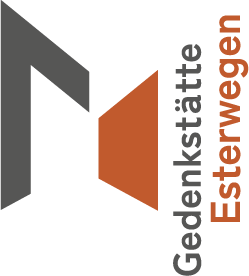Camp III
Brual-Rhede
Camp III Brual-Rhede was initially planned as a concentration camp for 1,000 prisoners in 1933, but was then used by the judicial administration as a penal prison camp as of May 1934. It was guarded by an SA unit in the service of the judiciary, which was later complemented by judicial officers.
In early 1938, the judiciary planned to expand the camp to accommodate 1,500 prisoners. In September 1938, however, eight barracks were disassembled and taken to the Palatinate. They were used there as accommodation for prisoners who had to perform forced labour during the expansion of the ‘Westwall’ (= western bulwark).
Up until the beginning of the war, the prisoners at the Brual-Rhede camp were people who had been persecuted by the Nazi regime on political, racial, social or religious grounds. In addition, there was a much larger group of prisoners who had been convicted of criminal offences. During the war, mainly former soldiers convicted by Wehrmacht courts were imprisoned.
Depending on the time of year, the prisoners had to perform 8-12 hours of forced labour in the moor every day (drainage, road and path construction, peat extraction). In particular, they were used for the expansion of the Brualer Schloote. Following the start of the war in 1939, they were increasingly deployed in essential war industries and in agriculture. In 1944, the engineering company Klatte from Bremen set up a factory at the camp where prisoners had to produce armaments, including aircraft parts. The rations were poor and inadequate in relation to the hard labour. In addition to this general ordeal, the prisoners were subjected to a great variety of physical and psychological abuse by the guards.
The civil registry records 59 deaths, but it is likely that the actual number is higher. The dead were buried in the Börgermoor camp cemetery, which is now the Esterwegen burial ground.
In February 1945, there were still 700 prisoners in the camp. They were transferred to the Aschendorfermoor camp at the beginning of April 1945.
Short guided tours:
Every 1st Sunday of the month, at 11am and 3pm. Please contact us in advance for a tour in English.




